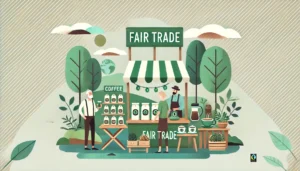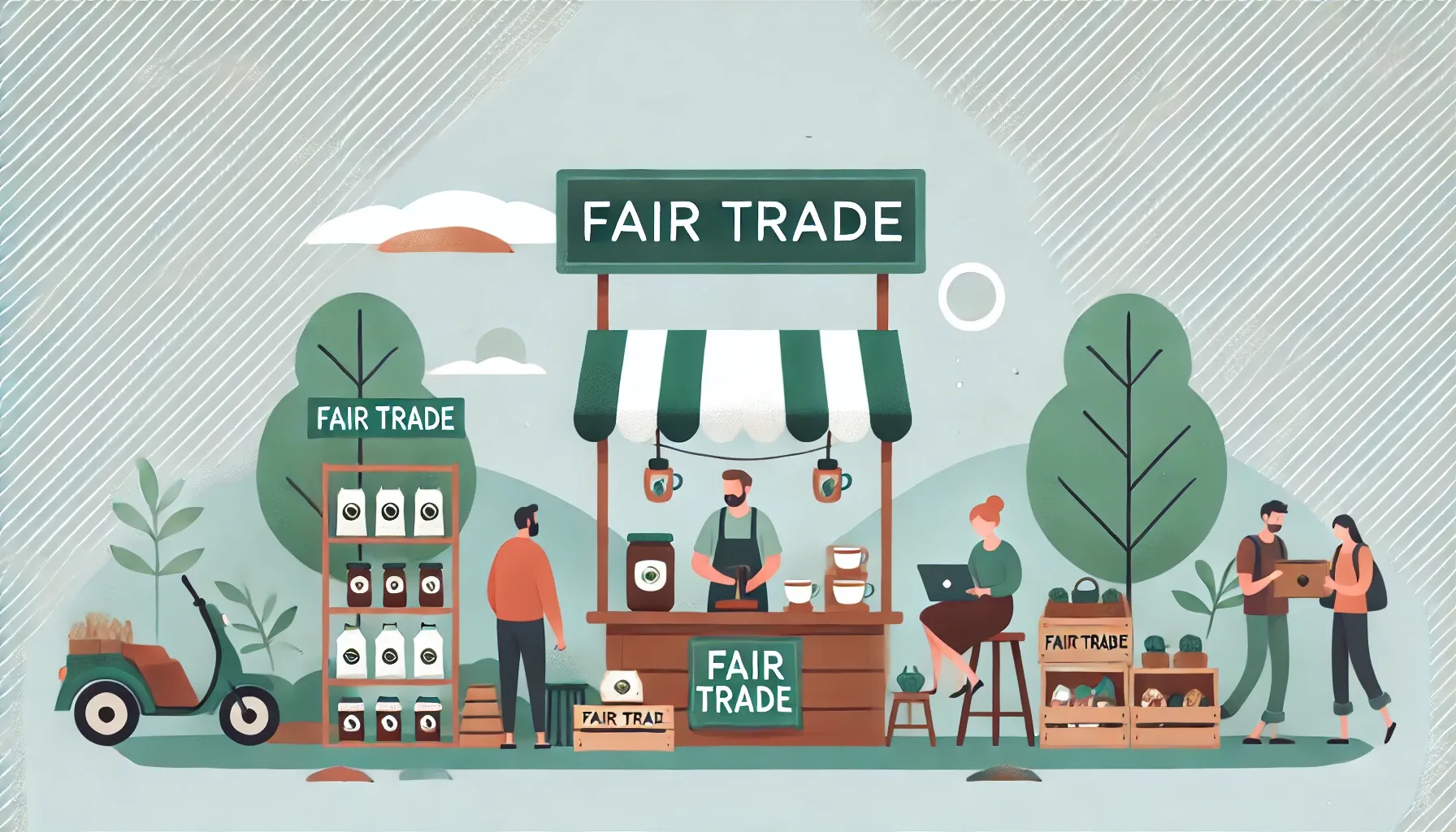Introduction
Over the last few years… ethical green living is no longer a fringe concept, it has become more and more of what people are aware companies could provide to both societal & environmental wellbeing. Fair trade is one of the most iconic features in this living lifestyle which provides guarantees to the producers from developing nations pay a price for their products that reflect fair compensation, plus social and environmental standards. Understand The Details of Fair Trade, Its Significance On Global Communities And Why It Plays A Vital Part In Sustainability Through This Comprehensive Guide.

Understanding Fair Trade
Fair Trade is a worldwide movement that seeks to alleviate poverty and promote sustainable development. It works towards improved trading terms and safeguarding the rights of marginalized producers & workers. The producers will receive a fair price for their products, work in safety conditions and under regulations concern the environment.
Key Principles of Fair Trade
Fair pricing: Producer price covers cost of production including living wage.
Fair Labor Practices: Producers will work in a safe environment free from abuse and forced labor.
Environmental sustainability: Reinforces good agricultural practices and ways to ensure that farming is not harmful.
Community Development: Invests in community projects like education, healthcare and infrastructures.
Transparency and Accountability: Maintains transparent, reliable administration and commercial relations.
How Fair Trade has Gone Global
Trade has always been about more than money, and fair trade is no exception. It attacks various social and environmental matters, thus making the world a more egalitarian place.
Economic Benefits
Fair Trade Helps Reduce Poverty: Fair trade enables producers to rise above the poverty line by ensuring fair prices.
Economic Empowerment: Gives makers the financial resources to grow their businesses and local economies.
Market Access: Makes global markets available to small producers who would otherwise be marginalized.
Social Benefits
Better Working Conditions: Fair trade means that workers work in safe environments and are paid a living wage.
Fair Trade organizations are based on the practice of gender equality: A lot of fair trade organizations see to it that men and women have equal wages in similar occupation roles.
Education: Money from fair trade can be used to put back into local communities in many ways, such as building schools or health clinics.
Environmental Benefits
Sustainable Agriculture: Support for environmentally friendly farming practices that use fewer chemicals and provide greater biodiversity.
Fair trade practices frequently encompass climate change mitigation in the form of long-term initiatives to slash carbon footprints and promote renewable energy sources.
Conservation Efforts: Helps to maintain ecosystems and wildlife by employing land use practices that are able to be fished in appropriately.
What is Fair Trade in regards to Ethical Green Living
Living a green ethical life is to make decisions that are good for the planet and people. There is fair trade which to my lifestyle and many others I know, see this as an integral part.
Ethical Consumerism
Ethical consumerism allows consumers to make purchase decisions that are beneficial to society, the economy and environment. Consumers who choose fair trade products know they are supporting:
Fair Wages: That the people who produced this are paid a fair wage.
Sustainability: Advocating green production practices.
Contribution in Social Justice: Towards fighting exploitation and poverty.
Reducing Environmental Impact
Fair trade products may be made sustainably to reduce negative impacts on the environment. This includes:
For instance, Organic Farming: Say no to pesticides and fertilizers toxic in nature.
Renewable Resources: Using renewable energy and resources that do not deplete.
Minimize Waste: Practices that help to reduce waste and recycle.
Institute For Social Responsibility To Bring Out The Best In Societies
Buying fair trade is an example of global social responsibility. It incentivizes better governance at companies and leads to a more fair global economy.
Fair Trade Certification & Labels
Consumers have to use information on fair trade certification and labels (e.g., fair trade hallmarks such as the following). Certifications like these verify that products adhere to particular fair trade practices.
Top Fair Trade Firms
Fairtrade International: The largest and most recognizable fair trade certifier, they set international standards for the certification of products.
Fair Trade USA: A leading certifier in the US, with a mission to better lives of farmers and workers.
WFTO (World Fair Trade Organization): It ensures the organizations abide by 10 principles of fair trade.
Recognizing Fair Trade Labels
Choose products with the Fairtrade Mark: Show that it has met fair trade standards worldwide.
Fair for Life, Social & Fair Trade Certification.
Fair Trade Certified: Your product was made with respect to upholding social, economic and environmental criteria.
The Problems/Challenges with Fair Trade
As great as fair trade can be, it is not a holy grail all of the time and its concept comes with problems and critics. Knowing about these can render a nuanced view on the movement.
Challenges
Market Access: Getting it to the market is still challenging for many producers often due to infrastructure, high travel costs and low resources.
Certification Fees: Fairtrade certification can be expensive, meaning that many small-scale producers are unable to afford it.
Lack of Consumer Awareness: Consumers are still not aware about the significance and benefits associated with fair trade.
Criticisms
Price Premiums: Some feel that fair trade can be expensive and the people who need the most access to healthy foods are low-income consumers.
Impact of Fair Trade: Critics argue that fair trade has little or no impact on poverty and development.
Standardization: Fair trade standards across different regions and products is not consistent.
The Future of Fair Trade
But over the long term, fair trade is still a bright spot dealing in ethical goods at slightly higher costs than their conventionally produced alternatives.
Growing Consumer Demand
Consumers are also starting to pull for ethically produced products which phases out only*. This is a trend that will likely continue and in turn boost growth of the fair trade market.
Technological Advancements
Technology is one of the things that can help solve some issues around fair trade. Blockchain technology, for example, has the power to boost transparency and traceability in supply chains that have been proven fair trade.
Greater Corporate Responsibility
An increasing number of companies are adopting corporate social responsibility (CSR) policies that include fair trade practices. A general move towards ethical business models could do wonders for the fair trade movement.
How to Support Fair Trade
Fair trade is not just about buying fair trade. There are many ways in which people and organizations can advance the movement.
Individual Actions
Choose Fair Trade: Shop for goods such as coffee, tea, chocolate and even clothing that is marked with fair trade labels.
Stay Informed: Take the time to research fair trade and educate your friends and family about it.
Advocate for Fair Trade: Encourage fair trade initiatives and policies.
Organizational Actions
Adopt Fair Trade: Businesses could adopt fair trade-certified products from fair-trade suppliers.
Fair Trade Organizations are Your Partners: Work with fair trade organizations to help them in their programs and projects.
Marketing & Promotions: Develop marketing and communications mechanisms to educate customers/stakeholders about fair trade.
Conclusion
Green living with ethics is all about making decisions that are not just good for the earth but to its inhabitants as well. This lifestyle cannot accurately be achieved without fair trade which helps the producers earn a fair price and ensures that they are working in safe conditions under sustainable practices. Fair trade benefits people and the planet, so supporting fair trade is a way individuals and organizations can participate in making our world just for all beings. As more awareness around consumerism continues to push for more ethical practices, the fair trade movement will continue to prosper with a healthier world community. More than being a label, fair trade is a potent weapon for achieving social justice along with economic stability and a sustainable environment. This is something we can all work towards by learning about what it means, how it works and the obstacles in its way to becoming a touchstone of ethical green living.
